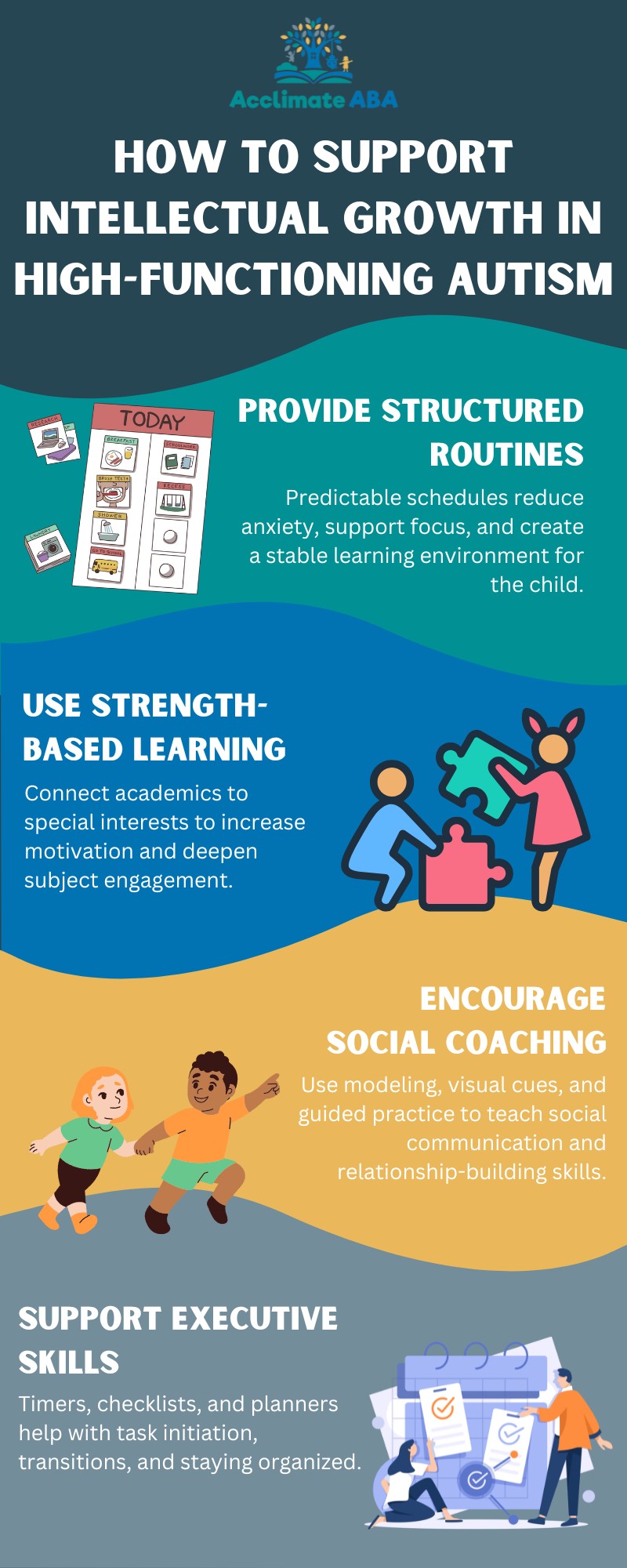Key Points:
- High-functioning autism is not synonymous with high intelligence but may present with unique cognitive strengths.
- Intelligence in autism is diverse, ranging from gifted abilities to specific learning challenges.
- Early intervention and individualized support are crucial to help autistic individuals thrive intellectually and socially.
When parents hear the term “high-functioning autism,” one of the first questions that arises is whether it correlates with higher intelligence. According to one study, up to 32% of autistic individuals exhibit an above-average IQ.
Conversations about high-functioning autism intelligence often center on observable strengths—like memory, problem-solving, or academic success—but overlook the full range of cognitive profiles in autism. While some individuals with autism exhibit above-average intellectual abilities, others may excel in certain areas while struggling in others.
For instance, an individual might have an advanced vocabulary but find social problem-solving or flexible thinking difficult. Recognizing this complexity helps parents support their child’s growth across all areas of development.
What Is High-Functioning Autism Intelligence?
High-functioning autism does not guarantee high intelligence, but many individuals show strong cognitive abilities in specific areas. Intelligence varies widely and should be evaluated through comprehensive assessments that go beyond academic performance.
Some individuals with high-functioning autism score well on IQ tests or show strengths in logical reasoning, memory retention, or pattern recognition. However, intelligence is multifaceted. Emotional regulation, abstract reasoning, and adaptive behaviors are just as important when understanding the full picture.
How Is Intelligence Measured in Autistic Individuals?
Measuring intelligence in children with autism requires a flexible and nuanced approach. Standard IQ tests are commonly used but don’t always capture the entire spectrum of cognitive potential.
Many children on the autism spectrum may struggle with attention, language comprehension, or sensory regulation, which can affect test performance. Therefore, neuropsychological assessments that consider both verbal and nonverbal IQ, executive functioning, and processing speed are more accurate.
Common tools include:
1. Wechsler Intelligence Scale for Children (WISC)
The WISC measures both verbal comprehension and nonverbal reasoning, making it a widely used tool for assessing intelligence in autistic children with varied communication strengths.
2. Stanford-Binet Intelligence Scales
Often used to assess intellectual disabilities or giftedness, this test evaluates reasoning, memory, and problem-solving across verbal and nonverbal domains, offering a broad view of cognitive ability.
3. Differential Ability Scales (DAS)
DAS is particularly useful for children with language delays, as it emphasizes nonverbal reasoning and processing, helping assess cognitive potential beyond verbal expression challenges.
4. Importance of Individualized Assessment
Standard scores may not reflect true ability if sensory, attention, or language challenges interfere. A comprehensive, personalized approach ensures a clearer understanding of each child’s unique learning profile.
Interpreting these results requires expertise, as strengths in one domain may mask challenges in another.
Common Cognitive Strengths in High-Functioning Autism
Children diagnosed with high-functioning autism often show standout abilities in specific areas, even when social or adaptive challenges are present. These cognitive strengths can be channeled to support academic and life success.
Some common strengths include:
1. Exceptional Memory
Children with high-functioning autism often display remarkable recall for facts, dates, or routines, which can be an asset in academics and daily life.
2. Strong Visual-Spatial Skills
Many excel in understanding visual information, making them strong in subjects like geometry, puzzles, design, or technical drawing.
3. Focused Interests
Deep concentration on preferred topics can lead to significant expertise and motivation to learn, especially when interests are encouraged and expanded.
4. Logical Problem-Solving
A natural preference for rules and patterns supports strong reasoning skills, particularly in structured or analytical learning environments.
5. Honesty and Rule-Following
These traits can foster trustworthiness and consistency, especially when applied in classroom settings, friendships, or future employment opportunities.
Identifying and nurturing these areas can lead to meaningful accomplishments.
What Are the Challenges Associated with Intelligence in Autism?
While certain intellectual strengths may stand out, they are often accompanied by specific cognitive or behavioral challenges. Understanding these issues is essential for developing a comprehensive support plan.
Areas of concern may include:
1. Executive Functioning Deficits
Children may struggle with planning, time management, or shifting attention, which affects academic and daily task performance despite strong intellectual ability.
2. Social Reasoning Difficulties
Even highly intelligent children can have trouble interpreting social cues or engaging in reciprocal conversation, impacting peer relationships and classroom collaboration.
3. Language Processing Issues
Some children may understand complex concepts but still struggle to express themselves clearly or interpret spoken language in real time.
4. Emotional Regulation Struggles
Managing strong emotions or sensory overload can disrupt focus and learning, requiring tailored strategies and emotional support systems to succeed.
These challenges often require structured supports like speech therapy, occupational therapy, or behavioral interventions.
Can High Intelligence Mask Autism Symptoms?
High intelligence can sometimes make it harder to recognize autism, especially in children who demonstrate advanced language, memory, or academic abilities. These strengths may cause educators and parents to overlook underlying struggles with social interaction, sensory regulation, or flexible thinking.
In some cases, gifted children may mask or compensate for their difficulties, delaying diagnosis. However, just because a child performs well in school doesn’t mean they aren’t facing hidden challenges.
Autism can present differently in intellectually gifted individuals, with subtle signs like rigid routines, social misunderstandings, or anxiety in unpredictable situations. Accurate identification allows for tailored support that addresses both strengths and needs, helping children thrive across all areas of development, not just academics.
Supporting Intellectual Growth in High-Functioning Autism
To help children with high-functioning autism succeed, parents and educators must foster both strengths and areas of need. Individualized support that adapts to the child’s profile is key.
Strategies for success include:

These practical tools make a measurable impact on learning and behavior.
When Should Parents Seek Cognitive Testing?
Parents should consider cognitive testing if their child shows uneven academic progress, struggles with problem-solving, or exhibits strong skills in some areas but delays in others. Early testing can identify learning differences, giftedness, or co-occurring challenges like ADHD or language disorders.
Cognitive assessments help build tailored support plans by highlighting both strengths and areas needing intervention. If teachers or pediatricians raise concerns about attention, memory, or processing speed, formal testing by a psychologist or neuropsychologist can provide crucial insights for educational and therapeutic decisions.
Nurture Your Child’s Potential With ABA Therapy
At Acclimate ABA, we believe that every child deserves support that honors their unique strengths and addresses their individual challenges. Through evidence-based ABA therapy in Utah, we help families navigate areas such as social interaction, communication, and executive functioning.
Get in touch with us to learn how personalized ABA services can foster both emotional and intellectual growth for your child with autism.



